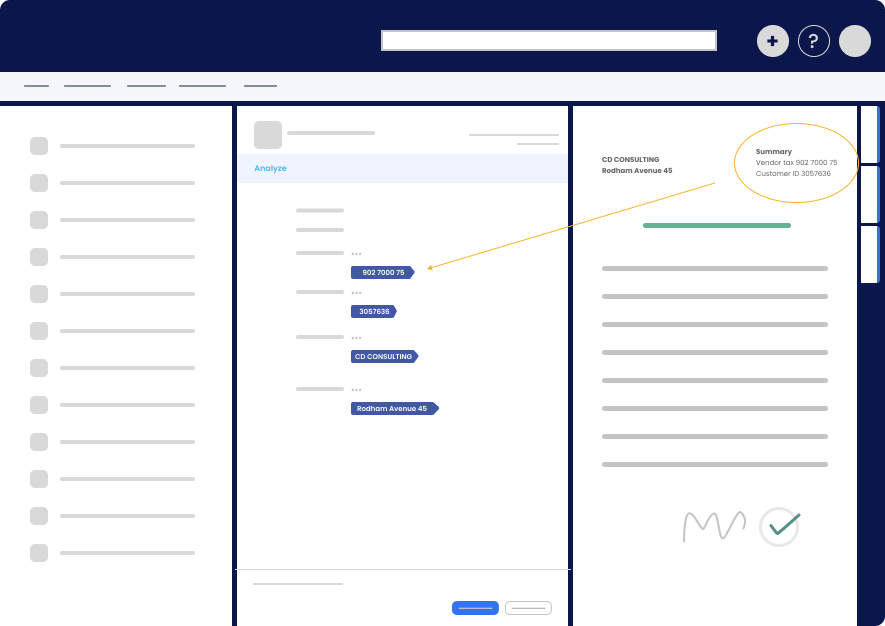Process Intelligence Kit (PI Kit) serves for ETL process (Extraction, Transformation, and Load) from M-Files to a specific database. There are three options: Data Export, Audit Log Export, and Logging. Data Export serves for exporting M-Files log data to a database, Audit Log Export serves for exporting M-Files audit to a database, and Logging serves for sending M-Files logs.
Configuration #
Data Export #
- Export vault data to a database
- Object changes, state and assignment changes
- Configure database connection
– Create an empty database in SQL Server - Configure PI Kit
- Execute the Setup database command to generate required SQL objects
- When the database has been set up, data can be exported in two ways:
– Manually, by pulling it from the vault – reconstructing events from object histories
– On a schedule, by reading events from M-Files Log - The recommended approach is first to pull from the vault manually, and then configure periodic export from M-Files Event Log
Buttons:
- Stop running task -> Stopping task to run while it is in progress
- Cancel pending tasks -> Canceling tasks that were meant to be executed afterward
- Setup database -> Connecting to a configured database
- Pull data – Generating data
- Update data
Audit Log Export #
- Periodical audit event export in a database
- Export audit log data to a database
- Login, logout
- Configure database connection
– Create an empty database in SQL Server - Configure PI Kit
- Execute the Setup database command to generate required SQL objects
- When the database has been set up, data can be exported in two ways:
– Manually, by pulling it from the vault – reconstructing events from object histories
– On a schedule, by reading events from M-Files Log
The recommended approach is first to pull from the vault manually, and then configure periodic export from M-Files Event Log - When the database has been set up, configure periodic export of audit events from M-Files Event Log
Button:
- Cancel pending tasks
- Setup database
Configuring PI Kit #
Data Export #
| Field | Value | Description |
| Enabled | Yes / No | Whether the operation is enabled or not |
| Export destination | Export destination database | |
| Database type | SQL Server | A type of database for export |
| Database type -> Connection string | Database connection string | |
| Value | Example: Data Source=[SERVER_NAME];Initial Catalog=[DATABASE_NAME];Persist Security Info=True;User ID=[USER];Password=[PASS] | |
| Use the secure password | Yes / No | Set password to use in the connection string. Any password value specified in the connection string above will be overridden with a value specified in the secured Password field. |
| Password | Password to use in the connection string. | |
| Export frequency | Frequency for exporting events from M-Files Event Log | |
| Type | Unknown, Interval, Schedule | |
| Type -> Configuration (Interval) | When Type = Interval | |
| Configuration -> Interval | Choose interval, numeric- | |
| Configuration -> Run on vault start | Yes / No | If true, runs when the vault starts. If false, the first run is scheduled to be after the interval has elapsed. |
| Type -> Schedule | When Type = Schedule | |
| Configuration -> Enabled | Yes / No | Whether the configuration is enabled or not |
| Configuration -> Triggers | Unknown / Daily / Weekly / Monthly | |
| Configuration -> Triggers -> Daily | Time | |
| Configuration -> Triggers -> Weekly -> Trigger Days | Add DayOfWeek | |
| Configuration -> Triggers -> Weekly -> Trigger Times | Add time | |
| Configuration -> Triggers -> Weekly -> Unrepresentable Date Handling | How to handle dates that cannot be represented – e.g. 29 February | |
| Configuration -> Triggers -> Weekly -> Trigger Days | Add number | |
| Configuration -> Triggers -> Weekly -> Trigger Times | Add time | |
| Configuration ->Run on vault start | Yes / No | |
| Included object types | All / Selected | This setting controls whether all events will be exported, or only those that occurred on selected object types |
| Object types filter | Object type | (if Included object types = Selected) – only those events that occurred on objects of selected types will be exported |
| Ignored login accounts | Login account | Events caused by login accounts specified here will be ignored |
| Data enrichment rules | These rules are used for the enrichment of exported data. You can define multiple rules to configure which metadata properties will be exported for any given object. | |
| Rule group -> Name | Group name. | |
| Rule group -> Rules | Rules are used for the enrichment of exported data. You can define multiple rules to configure which metadata properties will be exported for any given object. | |
| Rule -> Name | Rule name. | |
| Rule -> Description | Rule description. | |
| Rule -> Enabled | Specifies whether a rule is in use. | |
| Rule -> Filter conditions | Filter conditions define objects that this rule applies to. Multiple conditions inside a filter are combined with AND operator, while multiple filters are combined with the OR operator. | |
| Filter conditions -> Seach conditions | ||
| Rule -> Simple properties | Additional simple properties that will be included in data export. | |
| Simple property -> Property | ||
| Rule -> Custom properties | Additional custom properties that will be included in data export. | |
| Custom property -> Column name | Database column name. | |
| Custom property -> Type | Expression / TimelineId | Type of custom property. |
| Custom property -> Data type | Uninitialized, text, integer, floating, date, time, timestamp, boolean, lookup, multi-select lookup, integer64, file time, multi-line text, ACL | Expression result data type. |
| Data pull settings | Settings for pulling data from the vault | |
| Events insert health check | Frequency of periodic check if any unprocessed events exist in the database. If such events exist, the operation will be resumed. | |
| Events insert health check -> Type | Unknown / Interval / Schedule | |
| Configuration (Interval) -> Enabled | Yes / No | |
| Configuration -> Triggers -> Trigger | ||
| Trigger -> Type | Unknown / Daily / Weekly / Monthly | |
| Type -> Configuration (Daily) -> Trigger Times | Time | |
| Type -> Configuration (Weekly) -> Trigger Days | Add DayOfWeek -> Sunday, Monday, Tuesday, Wednesday, Thursday, Friday, Saturday | |
| Type -> Configuration (Weekly) -> Trigger Time | Time | |
| Type -> Configuration (Monthly) -> Configuration -> Unrepresentable Date Handling | How to handle dates that cannot be represented (e.g. 29 February) | |
| Type -> Configuration (Monthly) -> Trigger Days | Add DayOfWeek -> Sunday, Monday, Tuesday, Wednesday, Thursday, Friday, Saturday | |
| Type -> Configuration (Monthly) -> Trigger Time | Time | |
| Events insert health check -> Run on vault start | Yes / No | If true, runs when the vault starts. If false, the first run is calculated from the triggers. |
| Start date (inclusive) | ||
| Start time (inclusive) | ||
| End date (inclusive) | ||
| End time (inclusive) |
Audit Log Export #
| Field | Value | Description |
| Enabled | Yes / No | Whether the operation is enabled or not |
| Export destination | Export destination database | |
| Database type | Type of database for export. | |
| Connection string -> Value | Database connection string. Example: Data Source=[SERVER_NAME];Initial Catalog=[DATABASE_NAME];Persist Security Info=True;User ID=[USER];Password=[PASS] | |
| Connection string -> Use secure password | Set password to use in the connection string. Any password value specified in the connection string above will be overridden with a value specified in the secured Password field. | |
| Password | Password to use in the connection string. | |
| Export frequency | Unknown / Interval / Schedule | |
| Type (Interval) -> Configuration -> Interval | ||
| Type (Interval) -> Configuration -> Run on vault start | Yes / No | If true, runs when the vault starts. If false, the first run is scheduled to be after the interval has elapsed. |
| Type (Schedule) -> Configuration -> Enabled | Yes / No | |
| Type (Schedule) -> Configuration -> Triggers -> Trigger -> Type | Unknown / Daily / Weekly / Monthly | |
| Trigger -> Type (Daily) -> Configuration -> Trigger Times | Add time | |
| Trigger -> Type (Weekly) -> Configuration -> Trigger Days | Add DayOfWeek | |
| Trigger -> Type (Weekly) -> Configuration -> Trigger Times | Add time | |
| Trigger -> Type (Monthly) -> Configuration -> Unrepresentable Date Handling | How to handle dates that cannot be represented (e.g. 29 February) | |
| Trigger -> Type (Monthly) -> Configuration -> Trigger Days | Add number | |
| Trigger -> Type (Monthly) -> Configuration -> Trigger Times | Add time | |
| Ignored login accounts | Events caused by specified login accounts specified will be ignored. | |
| Logging account |
Logging #
| Field | Value | Description |
| Enabled | Yes / No | Whether the operation is enabled or not |
| Minimum log level | Verbose, debug, information, warning, error, fatal | Minimum log event level for sending events to file and event log. |
| Logging destinations | Logging destinations. Application restart is required for changes to this setting to take effect. | |
| File -> Enabled | Yes / No | Specifies whether logs are sent to a specified destination. |
| File -> Folder | The folder where log files will be generated. Requires vault restart for changes to take effect. | |
| File -> Logs file size limit (MB) | The approximate maximum size, in bytes, to which a single log file will be allowed to grow. When the file size limit is reached, a new file will be created. Filenames will have a number appended in the format <code>_NNN</code>, with the first filename given no number. Requires vault restart for changes to take effect. | |
| File -> Retention policy | Retention policy for log files. Requires vault restart for changes to take effect. | |
| Retention policy -> Verbose logs retention | The number of verbose log files to retain. Set to 0 to retain all files. | |
| Retention policy -> Debug logs retention | The number of debug log files to retain. Set to 0 to retain all files. | |
| Retention policy -> Information logs retention | The number of information log files to retain. Set to 0 to retain all files. | |
| Retention policy -> Error logs retention | The number of error log files to retain. Set to 0 to retain all files. | |
| Event log -> Enabled | Yes / No | Specifies whether logs are sent to Windows event log. |
| External dashboard -> Enabled | Yes / No | Specifies whether application logs are sent to the dashboard. |







